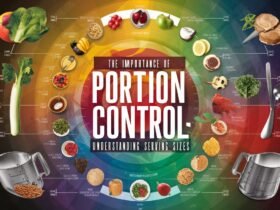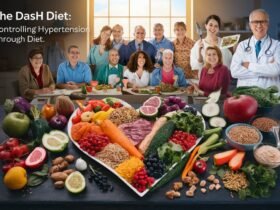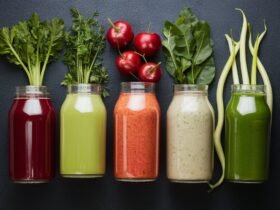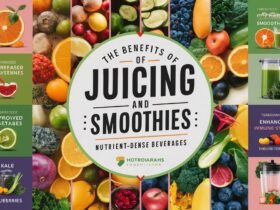The Importance of a Balanced Diet: Key Nutrients and Their Benefits
Hey there, my young and curious friends! It’s your nutrition buddy, Nita Sharda, here to talk about a topic that’s super important for keeping our bodies and minds healthy and strong – the importance of a balanced diet, and all the amazing nutrients that help us grow, learn, and feel our best.
Now, I know that when we hear words like “nutrients” and “balanced diet,” it might sound a little boring or complicated at first. But trust me, learning about the foods we eat and how they help our bodies is actually a really cool and exciting adventure!
So today, we’re going to explore the wonderful world of nutrition and discover all the different types of nutrients that our bodies need to thrive. We’ll learn about the superpowers of vitamins and minerals, the energy-boosting magic of carbohydrates, the muscle-building power of protein, and so much more!
What is a Balanced Diet?
First things first, let’s talk about what we mean when we say “balanced diet.” A balanced diet is all about eating a variety of different foods from all the different food groups, in just the right amounts to give our bodies everything they need to be healthy.
Think of it like a rainbow on your plate – the more colorful and diverse your meals are, the more likely you are to be getting all the important nutrients your body needs.
The main food groups that make up a balanced diet are:
- Fruits and vegetables
- Whole grains like bread, pasta, and rice
- Protein foods like meat, fish, eggs, and beans
- Dairy foods like milk, cheese, and yogurt
- Healthy fats like nuts, seeds, and avocados
By eating a mix of foods from all these different groups, we can make sure our bodies are getting all the different nutrients they need to grow, learn, and play.
The Superpowers of Vitamins and Minerals
One of the most important types of nutrients that our bodies need are vitamins and minerals. These tiny but mighty substances are like the superheroes of nutrition, each with their own special powers to keep our bodies healthy and strong.
Vitamin A: The Vision Hero
Vitamin A is like a superhero for our eyes, helping us to see clearly and protecting our vision from damage. We can find vitamin A in foods like:
- Carrots
- Sweet potatoes
- Spinach
- Milk and eggs
Vitamin C: The Immunity Booster
Vitamin C is another important nutrient that helps to keep our immune systems strong, so we can fight off germs and stay healthy. Some great sources of vitamin C include:
- Oranges and other citrus fruits
- Strawberries
- Kiwi
- Bell peppers

Vitamin D: The Bone Builder
Vitamin D is a special nutrient that helps our bodies absorb calcium, which is important for building strong bones and teeth. We can get vitamin D from:
- Sunlight (our bodies can make vitamin D when our skin is exposed to the sun)
- Milk and other dairy products
- Fatty fish like salmon and tuna
Iron: The Energy Giver
Iron is a mineral that helps our bodies make red blood cells, which carry oxygen to all the different parts of our body and give us energy to run, jump, and play. We can find iron in foods like:
- Red meat
- Poultry
- Beans and lentils
- Spinach and other leafy greens
These are just a few examples of the many different vitamins and minerals that our bodies need to stay healthy. By eating a balanced diet with lots of colorful fruits and veggies, whole grains, and lean proteins, we can make sure we’re getting all the nutrients we need to be our best selves.
The Energy-Boosting Magic of Carbohydrates
Another important type of nutrient that our bodies need for energy and growth are carbohydrates. Carbohydrates are like the fuel that keeps our bodies running, giving us the energy we need to learn, play, and explore the world around us.
There are two main types of carbohydrates:
Simple Carbohydrates
Simple carbohydrates are found in foods like fruit, milk, and sugar. They are called “simple” because they are quickly and easily digested by our bodies, giving us a quick burst of energy.
While it’s okay to enjoy simple carbohydrates in moderation, it’s important not to eat too many of them, as they can sometimes cause our blood sugar levels to spike and then crash, leaving us feeling tired and cranky.
Complex Carbohydrates
Complex carbohydrates, on the other hand, are found in foods like whole grains, vegetables, and legumes. They are called “complex” because they take longer for our bodies to digest, giving us a slower and more sustained release of energy throughout the day.
Some great sources of complex carbohydrates include:
- Whole grain bread and pasta
- Brown rice
- Oatmeal
- Quinoa
- Beans and lentils
- Vegetables like sweet potatoes, corn, and peas
By choosing complex carbohydrates more often than simple ones, we can help keep our energy levels stable and avoid those pesky blood sugar crashes.
The Muscle-Building Power of Protein
Protein is another essential nutrient that our bodies need for growth, repair, and maintenance. Protein is like the building blocks of our bodies, helping us to build and maintain strong muscles, bones, and other tissues.
There are many different types of protein foods, including:
- Meat, poultry, and fish
- Eggs
- Dairy products like milk, cheese, and yogurt
- Beans, lentils, and other legumes
- Nuts and seeds
- Soy products like tofu and tempeh
It’s important to include a variety of protein foods in our diets, as different types of protein have different amino acids (the building blocks of protein) that our bodies need.
Some tips for getting enough protein in your diet:
- Include a source of protein at every meal, like eggs for breakfast, a turkey sandwich for lunch, and chicken or fish for dinner
- Snack on protein-rich foods like nuts, seeds, or hard-boiled eggs
- Try plant-based protein sources like beans, lentils, and tofu, which are also high in fiber and other important nutrients
By getting enough protein in our diets, we can help our bodies grow and develop properly, and keep our muscles and bones strong and healthy.
The Importance of Healthy Fats
Last but not least, let’s talk about the importance of healthy fats in our diets. Fats sometimes get a bad reputation, but the truth is that our bodies need a certain amount of healthy fats to function properly.
Healthy fats are important for:
- Providing energy
- Helping our bodies absorb certain vitamins (like vitamins A, D, E, and K)
- Supporting brain development and function
- Keeping our skin and hair healthy
Some great sources of healthy fats include:
- Nuts and seeds
- Avocados
- Olive oil
- Fatty fish like salmon and sardines
It’s important to choose healthy fats more often than unhealthy ones (like fried foods or processed snacks), and to eat them in moderation as part of a balanced diet.
Putting it All Together: Tips for a Balanced Diet
Whew, we’ve learned a lot about the different types of nutrients our bodies need and where to find them in our food! But I know that sometimes, it can be tough to know how to put all this information into practice and create a balanced diet that works for you.
Here are a few tips to help you get started:
- Aim to eat a variety of different foods from all the different food groups (fruits and veggies, whole grains, protein foods, dairy, and healthy fats)
- Try to make half your plate fruits and vegetables at every meal
- Choose whole grain options whenever possible (like whole wheat bread, brown rice, and whole grain pasta)
- Include a source of protein at every meal and snack
- Limit your intake of added sugars, unhealthy fats, and processed foods
- Listen to your body’s hunger and fullness cues, and eat when you’re hungry and stop when you’re full
- Stay hydrated by drinking plenty of water throughout the day
- Don’t be afraid to try new foods and experiment with different flavors and cuisines!
Remember, a balanced diet is all about variety, moderation, and listening to your body’s needs. By making small, sustainable changes to your eating habits over time, you can develop a healthy and balanced relationship with food that will serve you well for years to come.
The Benefits of a Balanced Diet
So, why is it so important to eat a balanced diet, anyway? Well, my young friends, the benefits of a healthy and balanced diet are almost too many to count!













Leave a Reply